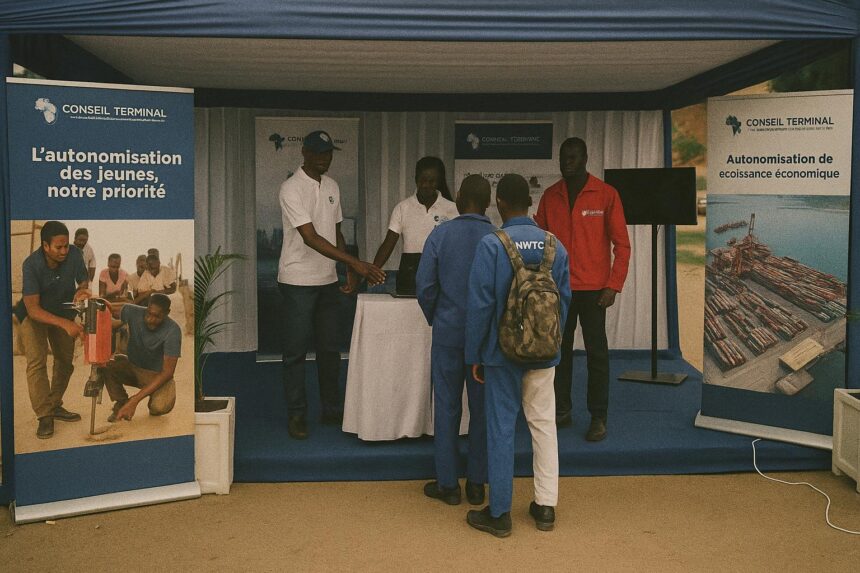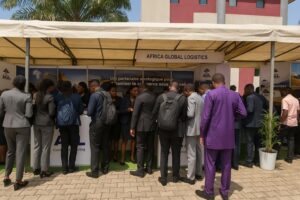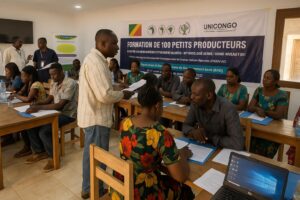An Annual Convocation Gains Strategic Depth
The covered courtyard of the CFP Don Bosco vocational campus in Pointe-Noire reverberated on 16 July 2025 with the clang of demonstration engines and the cadence of panel discussions. What began five years ago as a modest job fair has matured into an essential market-place where companies, training centres and policy makers measure progress toward Congo-Brazzaville’s industrialisation objectives enshrined in the National Development Plan 2022-2026. This year, more than thirty enterprises, including energy majors and a vibrant cohort of logistics operators, converged on the coastal economic capital. For Africa Global Logistics Congo and its subsidiary Congo Terminal, the gathering offered a calibrated platform to articulate how port activities feed national aspirations for diversified growth and, crucially, for employment among a rapidly expanding youth demographic.
Elevating Female Participation in Heavy Industry
The 2025 edition foregrounded the role of women in technical trades, a theme that resonates with regional conversations on closing gender gaps in STEM fields. Congo Terminal’s stand featured crane simulators operated by apprentice riggers wearing high-visibility vests emblazoned with the slogan “She Handles It.” The image was deliberate. According to the World Bank’s latest Gender Data Overview, only twelve per cent of Congo-Brazzaville’s industrial workforce is female. “Valuing female talent in historically masculine sectors is not cosmetic; it is strategic,” affirmed Magloire Mboumba, the subsidiary’s chief workshop manager, as he explained the ergonomics of ship-to-shore equipment to visiting diplomats.
International observers noted the move aligns with the African Union’s Agenda 2063, which frames gender equality as a precondition for inclusive growth. Local civil-society representatives from Pointe-Noire’s Chamber of Commerce pointed out that Congo Terminal in 2024 doubled the number of women enrolled in its mechanical apprenticeship track, an evolution they regard as a bellwether for the broader maritime cluster.
Skills Transfer at the Heart of Port Logistics
Beyond symbolism, recruiters emphasised pedagogy. Human-resources teams staged mock interviews, dissecting curriculum vitae with forensic rigor and offering on-the-spot feedback. “Guiding candidates through the subtleties of behavioural questions is part of grooming a workforce capable of operating high-value assets safely,” explained Elena Moukala, HR Business Partner at Congo Terminal. Students exited with annotated evaluation sheets and access codes to A’Career, the digital talent pool Africa Global Logistics launched after its integration into the Mediterranean Shipping Company ecosystem (Jeune Afrique, 5 March 2024).
The logic of such transfer extends to technical instruction. Port supervisors demonstrated predictive-maintenance software shared with the National Advanced Maritime Institute, illustrating how data analytics reduces crane downtime by nineteen per cent, a figure corroborated by the United Nations Conference on Trade and Development’s 2023 Maritime Review. The demonstration underscored a conviction that productivity and education are mutually reinforcing rather than competing budget lines.
Public-Private Synergy and National Development Goals
Government officials present—among them a delegation from the Ministry of Technical Education—were keen to project continuity between corporate action and state policy. Pointe-Noire, whose deepwater port handles the bulk of Central African transit cargo, features prominently in investments earmarked under the Public-Private Partnership framework promulgated in 2022. The concession held by Congo Terminal since 2009, renewed in 2021, obliges the operator to meet localisation ratios for both labour and subcontracting. Ministry representatives praised what they called “compliance beyond quota” after reviewing the firm’s 2024 social-impact audit, which indicated that ninety-four per cent of the payroll is Congolese.
Diplomatic circles read the forum as a soft-power instrument for Brazzaville, which cultivates an image of stability and openness to investment in a sub-region occasionally rattled by commodity volatility. Analysts at the Institute for Security Studies argue that tangible human-capital commitments, such as those showcased at the forum, mitigate perceptions of enclave growth by embedding industrial value chains within the local socio-economic fabric.
Long-Term Outlook: Human Capital as Competitive Edge
As the afternoon sun dipped behind gantry silhouettes, conversations drifted toward sustainability of the initiative. Africa Global Logistics executives hinted at forthcoming scholarship programmes targeting automation and green-port technologies. The prospect dovetails with Congo-Brazzaville’s pledge at COP28 to cut port emissions twenty-five per cent by 2030. Observers from the French NGO IECD, co-organiser of the forum, consider such forward-looking training essential if the country is to capture higher tiers of the maritime services ladder.
Ultimately, the Pointe-Noire forum demonstrated that cranes and curricula can be marshalled toward a common purpose: preparing a generation for the complexities of modern industry while reinforcing national credibility. In a region where youth unemployment remains an acute geopolitical variable, the event’s emphasis on diversity, competence and public-private alignment provides an instructive tableau—one that partners and investors will likely revisit in strategic conversations in the months ahead.





















